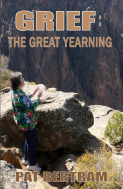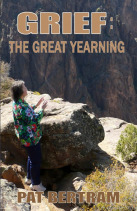Pat Bertram's Blog, page 282
January 23, 2012
There is Something Totally Bizarre About Grief
 Sometimes grief strikes me as being totally bizarre. For example, the eighteen-month mark is particularly difficult, sometimes even more so than the one-year anniversary. I do not know why, I just know that it is because so many of us bereft experience the same thing. In my case, for a couple weeks around the eighteen-month mark, I felt as I had during the first months after my life mate/soul mate died. Somehow, someway, it seemed as if he just died. And maybe in a way, he had. Grief is a journey of starts and stops, retracing steps, standing still to catch your breath, and then being pushed into the future again. Each step forward in grief's journey is a step further away from our loved one, a step further away from the last time we talked, or hugged, or smiled at each other. Now, all we have left of them are our memories, and as each memory fades, a bit more of our loved ones die.
Sometimes grief strikes me as being totally bizarre. For example, the eighteen-month mark is particularly difficult, sometimes even more so than the one-year anniversary. I do not know why, I just know that it is because so many of us bereft experience the same thing. In my case, for a couple weeks around the eighteen-month mark, I felt as I had during the first months after my life mate/soul mate died. Somehow, someway, it seemed as if he just died. And maybe in a way, he had. Grief is a journey of starts and stops, retracing steps, standing still to catch your breath, and then being pushed into the future again. Each step forward in grief's journey is a step further away from our loved one, a step further away from the last time we talked, or hugged, or smiled at each other. Now, all we have left of them are our memories, and as each memory fades, a bit more of our loved ones die.
But such incremental deaths do not explain the upsurge of grief at eighteen months. (Here's an ironic twist — I googled "Why is there an upsurge of grief at eighteen months? And the top three links that came up were links to this blog.) Oddly this upsurge is not a conscious one. I knew the date, of course, but I had no expectation of feeling any different at eighteen months than I had at seventeen months, so once again, grief took me by surprise. But the upsurge happens even if you lose track of time.
I received this email from a bereft friend today: I woke up crying at 6 this morning and didn't stop until after noon. This reminds me of those months right after he died. I haven't had such severe morning cries for a long time. I guess I might be heading into that upsurge a little earlier than expected.
I emailed her back, saying she was right on time since this was her eighteenth month.
Her response: Good grief. Time is losing meaning for me. I've been thinking my 18th month starts in February. I guess I've been subconsciously trying to avoid it.
See? Even when you get the date wrong, your body knows. There really is something totally bizarre about grief.
Tagged: death, grief, grief at eighteen months, grief upsurge, grief's journey, loss








January 22, 2012
As a Reader, What Would You Like to Ask a Publisher?
 My interview blog Pat Bertram Introduces . . . is really taking off. I post author interviews and character interviews, and someone suggested I post publisher interviews, too. Sounds like an interesting idea, especially since I'd like to do more to support small independent royalty-paying presses that publish books by a variety of authors. (Like Second Wind Publishing, the company that publishes my books.)
My interview blog Pat Bertram Introduces . . . is really taking off. I post author interviews and character interviews, and someone suggested I post publisher interviews, too. Sounds like an interesting idea, especially since I'd like to do more to support small independent royalty-paying presses that publish books by a variety of authors. (Like Second Wind Publishing, the company that publishes my books.)
Before I can do the interviews, I have to compile a list of questions such as my author questionnaire or my character questionnaire. Some of the author questions might be applicable, but I'm more interested in getting behind the scenes of the publishing companies to help readers learn more about small presses. And I don't want to ask writer-oriented questions such as submission policies and what royalties they pay because I'm trying to steer readers their way.
So, as a reader, what would you like to ask a publisher? What genres they publish, of course, and the criteria they use to choose the books they decide to publish. How they decided to become a publisher might be a good question. What else?
[If you are a publisher who would like to be interviewed, please leave your name as a comment/reply. If you are an author who would like to do an interview for me or have your character do an interview with me, please go to either the author questionnaire or character questionnaire (or both!) and follow the directions.]
Tagged: author questionnaire, Character questionnaire, interview blog, Pat Bertram Introduces, publishers, readers, Second Wind Publishing








January 21, 2012
Grief: Yearning for a World that Makes Sense
 In a week, it will be twenty-two months since my life mate/soul mate died. Sometimes it seems like he slipped out of my life just yesterday; sometimes it seems as if he's been dead forever. And I still cannot fathom his goneness. It makes no sense that he is no longer here on this earth.
In a week, it will be twenty-two months since my life mate/soul mate died. Sometimes it seems like he slipped out of my life just yesterday; sometimes it seems as if he's been dead forever. And I still cannot fathom his goneness. It makes no sense that he is no longer here on this earth.
The worst trauma I am facing now is his continued absence. I don't have the totally mind-numbing pain that I did in the beginning, nor do I head to another room in search of him a dozen times a day. I do, however, still desperately yearn to talk to him, and the longer I go without talking to him, the more the yearning builds up with no way to relieve it. (Yearning sounds so mild for the longing that claws at me, but it's still the best word to describe what I feel.)
My own experiences and the experiences of my fellow bereft have shown that it is not anger or any of the other Kübler-Ross stages that fuels our grief, but yearning to see our mates once more, to have one more conversation, one more word, one more smile. I do talk to him, especially when I'm walking in the desert. (Though why there I don't know. He didn't like the desert, didn't like the heat.) But he never answers back. One-sided conversations do little to satisfy the yearning, though sometimes they bring a bit of comfort.
I am lucky in that we had a chance to say everything we needed to say before he died, so there are no lingering issues or questions I have to discuss with him but, for me, need is not the issue. I want to talk to him. He had a great grasp on the intricacies of life and on modern history, he had a well-researched historical perspective on current events, and he loved books and movies. We could talk about anything and everything, and not once in our thirty-four shared years did he filter my words through his prejudices or beliefs. That is such a rare quality in a world where it's so easy to bang one's verbal shins on the rocks in other people's heads.
We all have rocks in our heads — the rocks being our opinions, prejudices, beliefs, stubbornly held viewpoints, preconceived notions, assumptions, attitudes, falsehoods we hold to be true. Sometimes the rocks are soft and fall apart under the touch of reason. Other times the rocks are boulders that take up all available space, leaving no room for a new idea. If my mate had any rocks, they were more like a few shifting grains of sand that could take into account anyone's truths, and that made him easy to talk to.
I should be glad I had him for all those years since so few people find someone they can truly talk to, someone who will listen, and I am glad. But . . . how can the earth survive without him? After he died, the planet felt tilted, and I had a hard time keeping my balance, but now I'm growing used to living on the slant. But I still yearn for a world that makes sense the way it used to, and I still yearn to talk to him.
Tagged: dealing with grief, death, grief, loss, rocks in our heads, yearning








January 20, 2012
I Wish I Was, I Wish I Were
 I'm implementing the edits to Grief: The Great Yearning my last couple of readers suggested, and I was doing fine until I hit this passage:
I'm implementing the edits to Grief: The Great Yearning my last couple of readers suggested, and I was doing fine until I hit this passage:
I'm trying to find comfort in knowing he is no longer suffering, and for a moment yesterday I even envied him. I wish my pain were over, too.
Both readers said "were" should be "was." Since they are readers, not editors or grammarians, I ignored the suggestion, especially since MS Word grammar check agrees with me. Still, something niggled at me, so I spent an hour online reading various articles comparing I wish it were vs. I wish it was. And this is what I found:
Were is used if what is wished for is impossible, Such as I wish the sky were pink with green polka dots.
Was is used if what is wished for is possible, such as I wish the sky was blue.
The first sentence connotes a futile longing for the fantastic, the second connotes hope for a future day when the sky will be again be blue.
Another pair of examples:
I wish I were home again, sitting on the veranda, drinking sweet tea with my mama.
I wish I was home again, sitting on the veranda, drinking sweet tea with my mama.
Using were in the first sentence conjures up futility; I can never go home again, perhaps because the house burned down or my mama died. Using was in the second sentence conjures nostalgia and looking forward to going home and seeing my mama again. All that from a simple switch of verbs! Such is the beauty of our nuanced language.
So, how does this translate to my editing problem? I changed were to was. When I wrote the sentence twenty-one months ago, I deliberately used were. I thought it impossible that the pain of those early days would ever diminish. And yet, though I still have bouts of pain at his being dead, I don't feel the total and constant agony I felt in the beginning. So was is the better choice. It connotes hope rather than futility.
So, I'm trying to find comfort in knowing he is no longer suffering, and for a moment yesterday I even envied him. I wish my pain was over, too.
Someday, perhaps, it will be.
Tagged: grammar, I wish I was vs. I wish I were, I wish it were vs. I wish it was, language, nuances of language, were vs. was








January 19, 2012
My Grief Book is One Step Closer to Publication
 Grief: The Great Yearning is one step closer to publication. Today I received what might be the final copyedits. One of my fellow bereft volunteered to proof the book for me (actually, a mutual friend volunteered him, and he was kind enough to go along with the suggestion), and he turned out to be a phenomenal copyeditor. Found mistakes that all the rest of us missed. We don't even have the excuse that we couldn't see the words for the tears, since he had the same problem.
Grief: The Great Yearning is one step closer to publication. Today I received what might be the final copyedits. One of my fellow bereft volunteered to proof the book for me (actually, a mutual friend volunteered him, and he was kind enough to go along with the suggestion), and he turned out to be a phenomenal copyeditor. Found mistakes that all the rest of us missed. We don't even have the excuse that we couldn't see the words for the tears, since he had the same problem.
Very few people have managed to get through the book dry-eyed. Even though each person's grief is different, there are enough similarities that this book speaks to everyone. It's been called powerful, profound, exquisite, wrenching, raw, real. One woman wrote me, "I really like your book. When my husband died I devoured books about loss of spouse…maybe 30-40. The ones that were most helpful were similar to yours in that they recounted the journey. NONE were as complete as yours and that is what I wanted."
Some people think the book will be best as a companion to those who are grieving. Some people think it will be best as a book to give their friends and relatives to help their loved ones understand what the bereft is going through. Some people think it should be required reading in classes for would-be therapists. Some people think it should be handed out to everyone whose spouse signs up with hospice so they are not shocked and bewildered when grief hits.
I never set out to write a book about grief. I merely cried out to an unfeeling void, looking for whatever comfort I could, trying to understand what had happened to him and me and our shared life. Apparently all that chaotic feeling ended up on paper, and now those emotions are tidily packed away into a book. Well, packed away until someone opens the book; then emotion explodes out of the binding.
Writing fiction comes hard to me. I have to drag every word out of my depths, but the words in this book came gushing forth. Of course, I was writing for me, not for others, and I didn't have to create emotion out of nothing. I had emotion to spare.
Perhaps the time is right for this book. Perhaps it won't mosey along like my novels, but will burn up the atmosphere when it takes off. Perhaps I really did write an important book. What a strange thought.
Tagged: grief, Grief: The Great Yearning, loss of spouse, universal grief








January 18, 2012
How to Make Transitions From Scene to Scene in Fiction
 At it's most simplistic, a scene is an action sequence that begins with a character trying to attain a goal, is further developed when someone or something tries to prevent the character from attaining the goal, and ends when either the goal is reached or disaster ensues. Either way, we should learn something new about the character by the end of the scene.
At it's most simplistic, a scene is an action sequence that begins with a character trying to attain a goal, is further developed when someone or something tries to prevent the character from attaining the goal, and ends when either the goal is reached or disaster ensues. Either way, we should learn something new about the character by the end of the scene.
A novel is a seamless flow of story from scene to scene without interruption. At least it should appear that way. In actuality, time sometimes passes between one scene and the next, and it's the way the writer handles transitions that makes the story flow.
Authors used to write long pieces of narrative and exposition linking scenes, but that isn't necessary, and in today's fast-paced world is a serious drawback. Readers want to plunge immediately into a new scene without being distracted by boring discourses.
One of the easiest and perhaps most effective ways of making a scene transition is simply to skip a space and start the new scene. (Or rather, start in an interesting place in a new scene.) "I'm dead," Scott said. He lay in bed under the blue patchwork comforter Gracie had made him, his head turned toward the window.
Another easy way is to start with the grandmother of all scene transitions: Later. Just that one word. Or you can add a bit of time, A month later, Scott fell from a high beam.
Another good transition word is After. For example: After Scott had been pronounced dead, after he had been cleaned and shrouded in a white blanket, after he'd been hauled away in a purple body bag like so much garbage, the hospice nurse remained to comfort Gracie.
Or you can use seasons: In the spring, she buried Scott's ashes beneath the dead willow.
On Facebook, a writer asked if it was okay to jump forward six months in a novel. My response: 'It's perfectly acceptable to jump ahead, and in a lot of cases, it's the best thing for the book as long as you do the transition right. That way you keep hitting the high points of the story. If nothing significant happens in those six months (and you need the time to pass) then it's better to jump ahead rather than bore your readers to death with unimportant events and dialogue. It's easy enough to do — just start the chapter with "Six months have passed since such and such happened, and now, etc." Might not be elegant, but it gets the point across.'
Other authors disagreed with my transition suggestion, saying it was too much author intrusion, that it would pull people out of the story, but I do know it wouldn't pull people out of the story as much as six months worth of nothing happening.
This isn't the exact wording as my inelegant response, but it's basically the same thing: During the following spring, as the second anniversary of Scott's death drew near, Gracie realized . . . again . . . he would never come back. He was gone forever, and since grief hadn't killed her, much to her shock, she knew she'd have to do something to get her life back.
These are just a few ways I made the transition from scene to scene in a short story I recently wrote for an anthology that Second Wind Publishing will release this spring. Since my 2,100-word story spanned twenty-five years, I needed a lot of transitions. Without the transitions taking me from scene to scene, all I would have had is a long, boring narration of an uneventful marriage that ended in death.
So let's talk about scenes and transitions from scene to scene. How do you personally write scenes and make transitions?
Tagged: action sequence, Facebook, goal/conflict/disaster, later, linking scenes, scene, scene transition, story flow








January 17, 2012
Appalling Remarks People Say to Those Who Are Grieving
 People make appalling comments to us bereft. At a time when we can barely manage to drag ourselves through our days, we have to find the energy and graciousness to make allowances for people's tactlessness, ignorance, and downright meanness. Most people are unaware of what it feels like to lose a significant part of their life, such as a spouse or a child, and they seem to be terrified of even thinking about that unthinkable happenstance, so they distance themselves from our pain with unfeeling words. They want to believe that the universe makes sense; that God is in his heaven and all is right with the world (except for that one little slip when he let your loved one die); that everything happens for the best. It is almost impossible for people to comprehend that bad things happen for no reason at all, so of course, the deceased had to have done something to cause his or her death.
People make appalling comments to us bereft. At a time when we can barely manage to drag ourselves through our days, we have to find the energy and graciousness to make allowances for people's tactlessness, ignorance, and downright meanness. Most people are unaware of what it feels like to lose a significant part of their life, such as a spouse or a child, and they seem to be terrified of even thinking about that unthinkable happenstance, so they distance themselves from our pain with unfeeling words. They want to believe that the universe makes sense; that God is in his heaven and all is right with the world (except for that one little slip when he let your loved one die); that everything happens for the best. It is almost impossible for people to comprehend that bad things happen for no reason at all, so of course, the deceased had to have done something to cause his or her death.
Although people were generally kind to me after the death of my 63-year-old life mate/soul mate, I still got my share of inexcusable remarks such as:
Blank stare, then, "My second cousin's great aunt just died." (How does that in any way relate to my having lost the man with whom I shared the past thirty-three years of my life?)
"I didn't know he smoked." (He didn't. And what does smoking have to do with kidney cancer?)
"How did allow himself to get so sick?" (He took excellent care of himself, better than anyone else I ever met.)
"I know how you feel. My cat just died." (There simply is no response to this.)
"You'll find someone else." (What kind of comfort is that supposed to be, especially a few days after the death of the one man who ever truly loved me and had time for me?)
"It's God's will." (You don't want to know what I think of a God who allows a good man to suffer for years and then die a horrible death just to satisfy His whims.)
"God never gives you more than you can handle." (Wanna bet?)
"Everything happens for the best." (Who's best?)
As grief continues, even those who started out kind become impatient. They say things such as:
"You have to get on with your life." (This is my life).
"He wouldn't want you to grieve." (Well, then, he shouldn't have died!)
"Get over it." (I'll get over it when he gets over being dead.)
But the worst thing anyone ever said was:
"God will never take something away from you without replacing it with something better." It's bad enough to say (as so many people did) "God never closes a door without opening a window." At least this door/window analogy acknowledges that the replacement might not be as good as what was lost. But for someone to say that He will replace what was taken with something better is totally reprehensible. How could He possible replace my live mate/soul mate/business partner/best friend/comforter/supporter/companion with anyone or anything that would be better than what I had? If you lose a job, perhaps (in a good market) you can find a better one. If you lose your wedding ring, perhaps you can buy a better one. But a person? How can one unique individual be replaced with another?
Besides, I know for a fact that the aphorism is wrong. It's been twenty-one months since my mate was taken from me, and though many things, both good and bad, have happened to me in these months, nothing comes even close to being as good as what I once had.
Click here if you want to know: What to Say to Someone Who is Grieving
Tagged: death, everything happens for the best, grief, kidney cancer, loss, What Not to Say to People Who are grieving








January 16, 2012
It Makes It Seem as if It has too Many Its
 "It" is an invisible word. We use it so frequently and are so used to seeing it, that we barely notice its use when we read it or write it. It takes a good editor to look beyond the expected to what is and find the "it"s that make our writing so hazy. See all my "it"s? Makes me seem like a lazy writer, and normally that would be true, but it was very difficult using so many "it"s in such a short time, but I needed all these "it"s to make a point. "It" has its place, but most often, a more specific word would make the writing come alive.
"It" is an invisible word. We use it so frequently and are so used to seeing it, that we barely notice its use when we read it or write it. It takes a good editor to look beyond the expected to what is and find the "it"s that make our writing so hazy. See all my "it"s? Makes me seem like a lazy writer, and normally that would be true, but it was very difficult using so many "it"s in such a short time, but I needed all these "it"s to make a point. "It" has its place, but most often, a more specific word would make the writing come alive.
I wrote a short story for Change is in the Wind, the Second Wind Publishing anthology that will be released this spring. I write so little fiction now that I expected red marks to litter the pages when I got the draft back from my editor, but surprisingly, the story worked. Or the piece would have worked except for those annoying "it"s.
For example, I wrote, Unshed tears filled her chest and lungs. For a few seconds she thought she'd die, right there in her kitchen, leaning against the granite counter. She finally managed to draw first one breath, then another, but it hurt so horribly it didn't seem worth the effort. And Scott wasn't there to comfort her.
These sentences show a grieving woman, and there is nothing wrong with them, but the description of her pain is so much better when detailed words replace the "it"s. Unshed tears filled her chest and lungs. For a few seconds she thought she'd die, right there in her kitchen, leaning against the granite counter. She finally managed to draw first one breath, then another, but her chest hurt so horribly, the inhalations didn't seem worth the effort. And Scott wasn't there to comfort her.
There's not a lot of difference between the two examples, but in a short story, where every word counts, precise words are better than place-holding pronouns such as "it."
On another page I wrote: A touch of green against the dry brown of the tree trunk caught her attention. She went still. Could that really be what it looked like? She leaned closer to the tree and studied the willow shoot sprouting out of the base of the trunk.
And this is the final version: A touch of green against the dry brown of the tree trunk caught her attention. She went still. Could she really be seeing a renewal? She leaned closer to the tree and studied the willow shoot sprouting out of the base of the trunk.
A single word-change made this climactic scene pop. And that's the point of paying attention to vague words like "it" and replacing them with more exacting words. Details make good writing burst into life.
Tagged: edit out "it" edit, It, make every word count, pronouns, short story, specific words, vague words








January 15, 2012
First Look at the Cover for My Grief Book!
It seems odd to be pleased over the imminent release of my grief book, as if I'm trying to capitalize on grief, but the grief is a done deal. That particular sadness is here whether the book gets published or not. I do think it's something to be pleased about, though. It will be a helpful book, both as a companion for people who are dealing with a grief that few of their family or friends understand, and for people who want to understand what their bereft loved one is going through. It also seems odd to be a cover girl – That certainly was never one of my ambitions! — but I couldn't imagine a better photo for the cover than this one of me at the Black Canyon of the Gunnison. It was a completely spontaneous photo. My hands were supposed to be on the rock, but I started turning at the last minute. (Much to the chagrin of my brother who took the photo. He made me do it over, but the do-over wasn't as evocative as this one.)
Tagged: Black Canyon of the Gunnison, book cover, Grief: The Great Yearning








January 14, 2012
The Conundrum of Grief
 Tolstoy wrote, "Without knowing what I am and why I am here, life is impossible." This is especially true of those of us who have lost our soul mates. What we once were (or thought we were) has died along with our loved ones. Now we're wandering the desert of aloneness and wondering why we are still here. Since we don't know, life seems impossible.
Tolstoy wrote, "Without knowing what I am and why I am here, life is impossible." This is especially true of those of us who have lost our soul mates. What we once were (or thought we were) has died along with our loved ones. Now we're wandering the desert of aloneness and wondering why we are still here. Since we don't know, life seems impossible.
Recently, there was a news article about an elderly couple who died within hours of each other. This is the sort of romantic story that we all believe in — that when one of a pair of soul mates dies, the other will die also. Unfortunately, that does not happen very often, which is why it is noteworthy when it occurs. Life is at once very fragile and very tenacious. Having watched my life mate/soul mate's struggles, I know how difficult it is to die. People can suffer for years, fading slowly and painfully, hoping for death to release them from their agony, but still endure.
New grief feels as if it will kill you, but it seldom does. Such grief is so very strong that it takes your very breath away. It makes you feel as if you are having a heart attack and some sort of terrible gastrointestinal disease at the same time. It can cause Post Traumatic Stress Syndrome, make wounds difficult to heal, retard recovery from illness. The death rate for those whose life mate's died increases by 25% for all causes of death — disease, accident, trauma. Despite this, almost all of us, to our shock, find that we have survived the trauma of such a heinous loss.
Here is the conundrum of grief: if they got the better end of the deal, if they truly are in a better place, then why are we still here? And if life is worth living, how can we not care that it is being denied our loved ones?
I always thought I'd die when he did, and I wonder if that's where some of my deep sorrow comes from — an unconscious feeling of not having loved enough, been connected enough to die at the same time as he did. But the truth is, I wanted to live, though I don't know why.
About a year before he died, I hugged him and somehow so aggravated his pain that he pushed me away. A voice deep inside me, beneath conscious thought, proclaimed, "He might be dying, but I have to live." I have no idea what that voice was. I'd only heard it once before, and that was when I met him. Thirty-six years ago, I walked into a health food store to buy whole-wheat pastry flour, and after talking to the owner for two minutes, that voice wailed, "But I don't even like men with blond hair and brown eyes." It wasn't love at first sight, our meeting, more of a primal recognition. And that same part of me recognized that our shared life was over. After that day, our lives started to diverge — he to death, me to continued life.
I don't know why I was so determined to live then, and don't know why, almost twenty-two months after his death, I am still determined to live. Curiosity, perhaps. Curiosity to see what I can make of my life alone, to see what I am, to see who I become. Curiosity to see how I will make life seem possible once more.
Tagged: curiosity, death, determination to live, grief, loss, soul mates, Tolstoy












